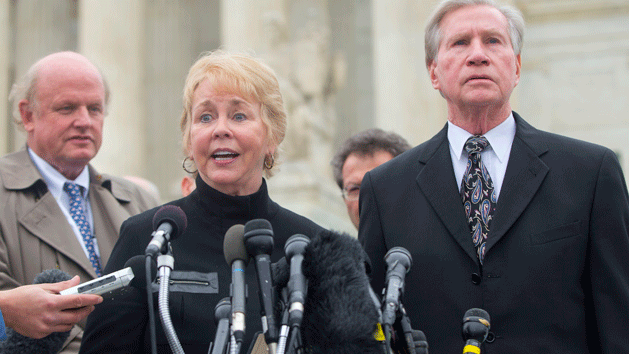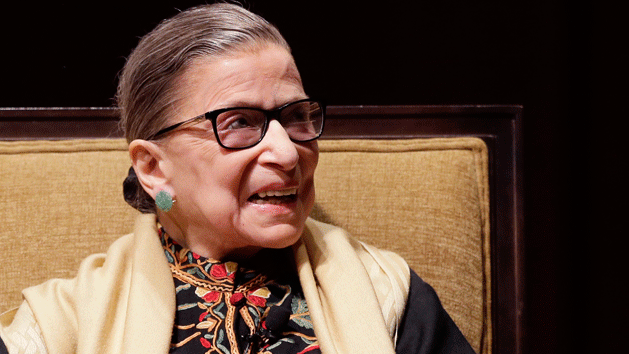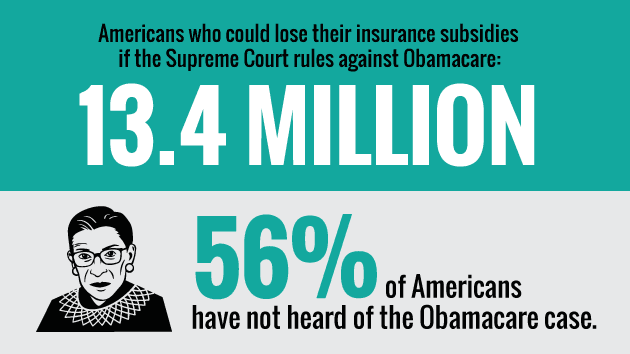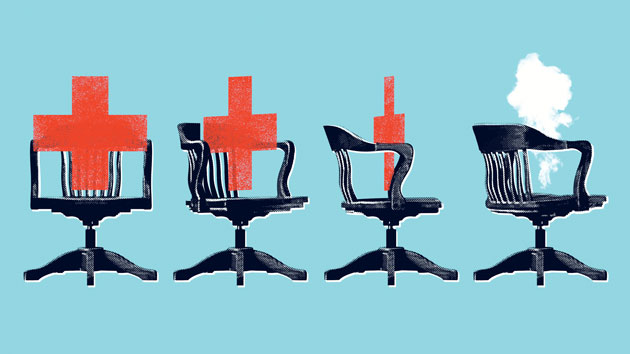
King v. Burwell plaintiff Doug Hurst (right), with his wife, Pam Trainor Hurst, and lawyer Michael CarvinPablo Martinez Monsivais/AP
During the run-up to the Supreme Court oral arguments in King v. Burwell, the latest legal assault on Obamacare, the four people named as plaintiffs in the case were mysteriously absent from public view. They never made any public statements. They never appeared at any conferences. These four Virginia residents who were supposed to be victims of Obamacare were essentially invisible in the highly politicized case. And their lawyers had good reason to keep them under wraps: It’s unclear if any of them have been injured by Obamacare and truly have standing to sue. One of the four, Brenda Levy, even told Mother Jones she didn’t want the lawsuit to end up stripping millions of Americans of their health insurance, which is what will likely happen should the plaintiffs prevail.
But finally, today, after oral arguments in the case, one of the plaintiffs, Doug Hurst, appeared outside the Supreme Court with his lead counsel, Michael Carvin, and lawyers from the Competitive Enterprise Institute, the conservative think tank that has propelled this lawsuit. CEI had promised that Hurst would speak. But he said nothing. He took no questions. Rather, his wife, Pam Trainor Hurst, read a prepared statement to the assembled reporters. Her comments were largely drowned out by protesters with bullhorns—anti-Obamacare protesters. But soon after, CEI released her statement.
She said:
Decisions made here in Washington directly affect middle-class families like ours, and we believe it’s time for those who have been hurt by Washington to take a stand—that’s why Doug joined the case. We never imagined we would end up at the Supreme Court, but that just shows how important this case is, not just for us, but for so many others around the country who are hurt by Obamacare.
There are millions of Americans who have lost their plans or their doctors. Or who, like Doug and I, are forced by the Internal Revenue Service to either buy insurance we don’t want or face a tax penalty. We want Americans to have options. We believe there is a better way to take care of the people who need help. But there is no reason to force millions of us to pay tax penalties if we don’t join a government program.
It seemed odd that Trainor Hurst was speaking, given she was not a party to the lawsuit. Where were the other plaintiffs? On this big day for the anti-Obamacare crusaders, it seemed, CEI was sticking to its strategy: Keep the plaintiffs out of sight.
Details about the mysterious plaintiffs started to trickle out last month, when Mother Jones and other news outlets tracked them down. They had all been instructed not to talk to the media. But it did appear the lawyers on this case had a difficult time trying to find real people to headline the lawsuit, which had been ginned up by conservative legal scholars and funded by the libertarian CEI.
The plaintiffs who did make the cut weren’t exactly fit for prime time. I met two of them in person. David King, the lead plaintiff, held extreme anti-Obama views and believed that all the people who would lose health insurance if he won his case were probably on welfare and “not paying for it.” Levy seemed utterly baffled as to how she ended up becoming a plaintiff and was concerned to discover that her case, if successful, would boot millions of people off their health insurance.
Another plaintiff, Rose Luck, was living in a motel when she became a plaintiff. She has lost her house to foreclosure and once had thousands of dollars in liens filed against her for failing to pay medical bills. She, too, was an Obama hater, writing on Facebook that he had been elected due to a Muslim conspiracy.
I never spoke with Doug Hurst, whose standing in the case was challenged by Justice Ruth Bader Ginsburg in the oral arguments on Wednesday. But I learned that he and his wife had filed for bankruptcy in 2010. Federal court filings showed that they were paying more than $1,300 a month in health insurance premiums in 2010, and that in 2009, they had more than $8,000 in out-of-pocket medical expenses. If Doug had purchased health insurance this year through the federal exchange, he could have gotten it for $62 a month.
I did speak briefly with Hurst’s wife, Pam. She is a tea party sympathizer who loves Sen. Ted Cruz (R-Texas) and former Florida GOP Rep. Alan West. She also held strong opinions about the president and Obamacare. She seemed a far more likely plaintiff in the King case than her husband. So why didn’t the lawyers sign her up?
That’s easy: She’s too old. At 65, Pam Trainor Hurst presumably receives subsidized health care through Medicare. Despite what she said today, she is not forced by the IRS to buy insurance or pay a penalty. Her beefs about Obamacare are largely moot. Given the shaky legal foundations of the case, perhaps it was fitting she was the person who spoke for this anti-Obamacare effort.

















